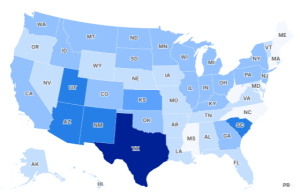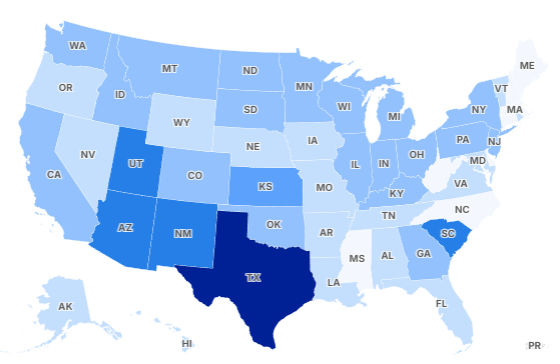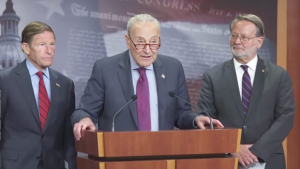DHS Records Raise New Concerns Over Foreign Influence in 2024 Race
Freshly unsealed documents from the Department of Homeland Security have triggered a new wave of concern inside Washington, D.C. At the center of the storm: a prominent figure from the 2024 election cycle. And the warning signs didn’t come from the campaign trail—they came from inside U.S. intelligence.
What the Documents Reveal
The records came to light after a successful FOIA lawsuit by Judicial Watch. They include email exchanges between DHS and FBI officials, written in August 2024. The tone was serious. One message simply stated: “China is happy.”
That blunt remark wasn’t a joke or out-of-context comment. It followed the official announcement of Tim Walz as Vice President Kamala Harris’s running mate. And it wasn’t the only red flag.
Another communication, referencing classified intel feeds, noted:
“Walz’s got the VP. You all have no idea how this feeds into what [China] has been doing here with him and local gov.”
In plain English: DHS and FBI were worried.
The Bigger Picture Inside DHS
Multiple emails referenced an ongoing internal assessment. The nature of that assessment? Tracking how Beijing’s soft-power strategies might intersect with American politics—particularly at the state and local level.
Though no wrongdoing by Walz is confirmed in the documents, the pattern raised eyebrows. One official said the intel matched raw reports (or “rin”) they had previously flagged. Another noted the FBI was “leading a couple of things,” possibly hinting at ongoing investigations.
What’s most telling is the consistency. DHS officials repeatedly echoed a similar theme: concern, unease, and the feeling that something didn’t sit right.
Why Walz?
Tim Walz isn’t new to U.S.-China relations. Before entering politics, he spent time teaching English in China. Later, as Governor of Minnesota, he took part in several trade missions to Beijing. He often highlighted these efforts as assets in global diplomacy.
But critics now see that background differently. They suggest those repeated trips, and his openness to Chinese engagement, made him vulnerable—maybe even a strategic “in” for China’s long-term influence plans.
According to a DHS whistleblower, that’s exactly how Chinese intelligence saw him.
Whistleblower Adds Weight to Claims
The House Oversight Committee previously heard testimony from a whistleblower inside DHS. Their claim: China viewed Walz as someone they could “get to D.C.”
Until this point, that testimony raised eyebrows but lacked documentation. Now, these newly released DHS emails seem to back it up. Intelligence officials weren’t just theorizing. They were reacting in real-time—days before the VP announcement—with concern that Beijing celebrated the pick.
Political Fallout and Reactions
The 2024 Harris-Walz ticket eventually lost to Donald Trump and JD Vance. But this story doesn’t end with an election result. It reaches deeper.
Tom Fitton, president of Judicial Watch, called the documents “deeply troubling.” He described them as part of a “larger pattern of foreign powers exploiting our political vulnerabilities.”
Others wonder: If someone like Walz can raise these kinds of red flags, who else might be under quiet observation?
Internal Friction and Missed Warnings?
Notably, the DHS messages also hint at bureaucratic challenges. Some emails referenced concerns about jurisdictional issues in the 9th Circuit Court of Appeals. Others mentioned slow coordination between departments.
All of this points to a recurring issue inside U.S. intelligence: red flags get raised, but follow-through becomes murky.
Walz’s Silence
To date, Tim Walz has not responded to the release of these documents. His office has issued no formal comment. Given the sensitivity of the claims, silence may speak volumes.
For many voters, this isn’t just about one man’s past. It’s about trust, transparency, and the invisible chessboard that often determines the real game of politics.
What Happens Now?
The release of these documents comes at a time when faith in government remains fragile. Americans are demanding answers—not just from politicians, but from the systems meant to hold them accountable.
Whether or not Walz knew about Beijing’s interest, the very fact that DHS and FBI tracked it so closely will add fuel to growing skepticism about foreign influence in American elections.
Final Thoughts
China’s long-term strategies are no secret to anyone paying attention. What’s new is how close they may have come to seeing their preferred candidate rise to power—with internal intel watching from the sidelines.
The question now isn’t just “What did Walz know?” It’s: “What else don’t we?”

Emily Johnson is a critically acclaimed essayist and novelist known for her thought-provoking works centered on feminism, women’s rights, and modern relationships. Born and raised in Portland, Oregon, Emily grew up with a deep love of books, often spending her afternoons at her local library. She went on to study literature and gender studies at UCLA, where she became deeply involved in activism and began publishing essays in campus journals. Her debut essay collection, Voices Unbound, struck a chord with readers nationwide for its fearless exploration of gender dynamics, identity, and the challenges faced by women in contemporary society. Emily later transitioned into fiction, writing novels that balance compelling storytelling with social commentary. Her protagonists are often strong, multidimensional women navigating love, ambition, and the struggles of everyday life, making her a favorite among readers who crave authentic, relatable narratives. Critics praise her ability to merge personal intimacy with universal themes. Off the page, Emily is an advocate for women in publishing, leading workshops that encourage young female writers to embrace their voices. She lives in Seattle with her partner and two rescue cats, where she continues to write, teach, and inspire a new generation of storytellers.









